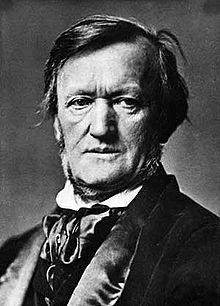- Die Hochzeit
-
Richard Wagner  Operas
Operas- Die Feen (1833)
- Das Liebesverbot (1836)
- Rienzi (1840)
- Der fliegende Holländer (1843)
- Tannhäuser (1845)
- Lohengrin (1848)
- Tristan und Isolde (1859)
- Die Meistersinger von Nürnberg (1867)
- Der Ring des Nibelungen:
- Das Rheingold (1869)
- Die Walküre (1870)
- Siegfried (1871)
- Götterdämmerung (1874)
- Parsifal (1882)
Uncompleted operas
- Die Laune des Verliebten (1830)
- Männerlist grösser als Frauenlist (1838)
Die Hochzeit (The Wedding) is an unfinished opera by Richard Wagner which predates all his completed works in the genre. Wagner completed the libretto, then started composing the music in the second half of 1832 when he was just nineteen. He abandoned the project after his sister Rosalie, who was the main supporter and the spokesman of the family, expressed her disgust at the story. Wagner abandoned the composition and destroyed the libretto.
Today, only three pieces survive from the opera.[1]
Synopsis
What is still known of the story is that it concerns the events surrounding the intended marriage of a young woman, Ada, to Arindal. This is a political marriage, not one of love. On the eve of the wedding, Ada's lover, Cadolt, comes to see her. She rejects his advances, preferring to defend her honour but, in the process, pushes him over the balcony to his death. Ada still loves Cadolt and collapses and dies at the funeral next to his body.
Ada and Arindal were later the names of the two principal characters in Die Feen (The Fairies) (1833), Wagner's first completed opera.
Notes and references
- ^ Entry for "Wagner, Richard" The Concise Oxford Dictionary of Opera. John Warrack and Ewan West. Oxford University Press, 1996. Oxford Reference Online. Oxford University Press.
Die Feen (recording and textbook, 1984), Munich: Orfeo GmbH.
Categories:- Operas by Richard Wagner
- German-language operas
- Unfinished operas
- Operas
Wikimedia Foundation. 2010.
